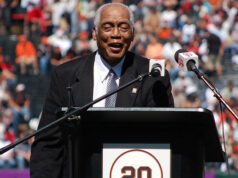By Paul Schienberg, PhD
One characteristic that connects us humans is the desire to assign meaning and causality to events that occur in our lives. These are called attributions. Only those who have reached some extreme level of spiritual development have “given up these quests.” Let me save you some time! We are not one of them. We, mere mortals, keep creating stories (attributions). I do not use this word (stories) critically. The word is meant to imply that we have no way of being completely assured that our stories represent the truth. Regardless, the stories are very powerful and effect what we do and how well we do it. This is as true in sports as in any other area.
Turn on the WFAN radio station anytime of day or night (except when Don Imus is on). For those of you who are not living in the New York City area, this is an all sports call-in radio station. Almost twenty-four seven hosts of the programs get stories from their listeners. The goal is to explain what happened to their favorite sports teams and athletes the day before. This is often followed by predictions of what will happen and why. The hosts, in an authoritarian tone, will either confirm what they are hearing or tell the caller how incredibly wrong headed they are. Each side is very convinced of their stories. The side that wins the argument is not the one who owns the truth but the one who is most wedded to their truth and shouts louder. The ultimate weapon is the hang up. Whoever clicks the other off first seems to think his truth is best.
As athletes, we rely upon stories to make sense of our performance. Those stories that athletes tell themselves and others have dramatic impact on future performances. Coaches and players are remarkable storytellers. It is good for us to know how to create stories that help improve performance. It is important for coaches to ask their players what internal stories are being used to make sense of a performance. Many coaches would be shocked to hear them sometimes.
All attributions are attempts to answer a question or explain a fact. Here’s a list of “facts”. Each item will need a story to explain it.
- I hit so badly last night at Fenway Park.
- I have never won a tiebreaker against her.
- Our team always collapses in the last two minutes.
- I play better on the road.
- I lost tonight with Jorge Pasada behind the plate.
- I am now 2 hits for 21 appearances against Pedro Martinez.
You get the idea. For each one of these items, many stories could be told. Take a few minutes and, as an exercise, let your imaginations go. Create a few stories for each. Let your imagination run wild. It is fun. Share them with a friend or athlete that you know. It’s like a party game. Depending on the story, imagine how it might effect future athletic performance!
I’ll take one of the questions and you will get a sense of the impact these stories have on our behavior and performance outcome. After throwing the options in a hat, I pulled “I hit so badly at Fenway last night.” Possible stories include:
- Being a left handed hitter the Park was designed to bring out the worst in me. If I was only right handed
- The crowd is so close to the field that I could hear the crowd yelling the food orders to the attendants.
- I was a Boston Red Sox fan as a child and I don’t have it in me to make them lose in front of their fans again.
- My ex-girl friend still lives in the Boston area and loves coming out to a night game. I agined her sitting with her new boyfriend and becoming excited if I hit a home run. So, maybe I was over swinging.
- There is something about the Boston hotel we stay at. I just can’t get a good nights sleep there.
- I am not a good enough hit Pedro Martinez.
What, as a coach, do I want to say to my player who comes up with any of these stories? “See a shrink, take medication, go to the wacko ward and your fired!” These stories have different characteristics requiring different interventions.
In the first story, the athlete is employing an external explanation. He feels out of control and powerless to effect his performance. I would want to know what it is about the structure of Fenway that gives him problems. Then, I would think about ways in which we can work to change his mental and physical approach and use the Park to play into his strengths.
The second story also has an external approach. As a coach, you must be careful about putting down your athlete’s problems regardless of how absurd the story sounds. If the athlete can chuckle at the story, it would provide some mental distance from what is bothering him/her and improve focus. Try to teach some techniques for getting into the here and now. Try to foster a sense of personal power!
The third story is an example of taking too much responsibility for his performance. He is thinking too deeply. It has become a “thing” in itself. Not to sound too off color – but if you obsess about a failed sexual performance; it will become a problem that will effect future events. Bad games happen to all of us. Let the athlete know “that the pitcher was really on his game. It happens.” These kinds of ideas will empty his mind and allow him to focus on the here and now when he hits again.
The fourth indicates that the player needs to be a hero. As a coach, you want to take the pressure off. The team doesn’t need one player to save the day – let him know that you want him to just do his job. Trying to impress others results in tightening the muscles and changing his swing. Stay within yourself!
The fifth story may hide other facts. He is concerned about his job security. Let him know that he is not expected to do everything well now. “He is here to learn.” Or, he feels like he ought to be staying at his mother’s house when he is in town. These kinds of stories may not be unconscious. All he needs to do is know you are available as a caring and trust-worthy listener. Something is on your player’s mind and it is always better to talk about it.
The sixth story is a skill-related explanation for events. Pedro Martinez does throw all his pitches with the same motion. Your hitter cannot rely on that information to help his performance. Teach him some other approaches that may help him improve his attitude towards hitting Pedro. Emphasize the ideas of just making contact, trying to keep his feet planted, cut down his stride, learn the pitches he tends to throw in various situations, etc. These may give the athlete a little edge and some hope of doing well. If he is one of your better hitters, remind him of that. It is always helpful to get accurate praise.
Attributions are the means by which we make sense of the world. Most attributions are learned approaches to explaining events in our life. If they are learned, they can be unlearned and new ones put in their place. It is important to be conscious of the attributions being employed. This is especially true when they negatively impact our results. Once we are conscious, we can alter them and substitute others that are more productive and create better performance.













